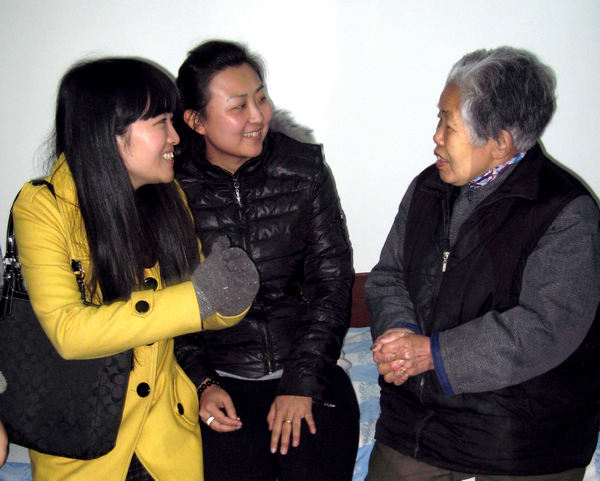Tapping into CSR
Many Party secretaries at foreign-funded companies agreed that their foreign partners have become aware of the advantages of having Party members as employees.
There are more than 100 Party members at the Shanghai office of DuPont, the global chemical sciences giant whose research and development department boasts the highest number of Party members out of the five Party sub-branches at the company.
|
 |
|
Two Party members visit a low-income elderly resident in Shanghai. Provided to China Daily |
Party members at DuPont are required to study not only the latest Party policies, but also production strategies and management skills, said Bai Nan, leader of the company's No 2 sub-branch.
"It's safe to say that Party members at DuPont can contribute to world-class technological breakthroughs," said Sun, who regularly leads the activities at the company.
"In many cases, foreign executives have started to acknowledge that Party members usually take an upfront role and are exemplary employees who perform well at work and bolster the company's business development," said Lu Qianfeng, director of Colliers International in Shanghai, a leading real-estate services provider.
He cited the example of a young Party member at his company whose job involves client management and scouting out locations for businesses throughout the city.
 |
"The management team recognized her outstanding abilities, which left a deep impression on our clients and is conducive to our brand image," said Lu.
Colliers' Shanghai operation has 16 registered Party members among its more than 200 employees, and although that number doesn't amount to a large proportion of the total workforce, the members are usually highly ranked in the annual performance assessments conducted by top executives.
Young Party members also provide assistance to children whose parents have moved away for work. They arrange activities for the kids, teach them basic math and interact with them on the weekend. All of this is done with close cooperation of the Middle Huaihai Road Community Commission, said Dai Qiming, head of the commission.
In general, these members are usually upbeat at work and are especially keen to integrate corporate culture into their daily routine, he said.
The best scenario is to combine Party life with a company's pronounced strengths and also to implement corporate social responsibility through initiatives, according to Party secretaries.
"As most white-collar Party members are under great pressure at work, we encourage them to get away from the office environment and serve the local community on a monthly basis," said the Party secretary of the US commodity company that helped organize health lectures with Sun.
The company's Party branch in Shanghai, established in 2008, has now grown into four sub-branches with 50 active members.
To engage with residents, the members acted in a self-written play that warned the elderly of a number of prevalent fraud schemes, Sun said. Meanwhile, in October, they organized a quiz on anti-theft issues and distributed fridge magnets bearing security tips to all the participants.
They are now on course to roll out a series of lectures on traditional Chinese medicine, which will be delivered by experienced doctors from top-grade hospitals.
Party life in many of Shanghai's foreign-funded enterprises follows a pattern whereby the branch produces a draft plan of action for a specific issue and then discusses it with the local community Party organization, under Sun's leadership.
The revised plan is then implemented jointly by company Party members and third-party specialists. Usually these plans are funded by the company and the local community organization.
One of the world's leading manufacturers of alcoholic beverages, Anheuser-Busch InBev, employs this hybrid model.
According to Han Xue, head of the company's 43-member Party branch, members engage in volunteer work organized by the local community Party organization and in homegrown charities that are closely related to the companies' core businesses.
For instance, AB InBev feels that it has an obligation to set a high industry standard in encouraging a responsible attitude toward its products. As a result, Party members act as advocates, promoting responsible drinking and discouraging alcohol abuse.
Since 2011, they have also financed the construction of three Hope Schools, establishments that provide free education for children from impoverished rural families, and regularly donate school supplies to the impoverished students.
"The rationale is that if Party members play a pioneering role in corporate social responsibility, it will be beneficial to company's brand image and the individual employees," said Han.
Contact the author at hewei@chinadaily.com.cn
